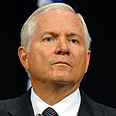
In a broad call to diplomatic arms, Gates exhorted leaders from the Gulf to band together to force Iran to stop its uranium enrichment program and to help the fragile Iraqi government.
"There can be little doubt that their destabilizing foreign policies are a threat to the interests of the United States, to the interests of every country in the Middle East, and to the interests of all countries within the range of the ballistic missiles Iran is developing," he continued.
Gates goaded Iran to acknowledge its bad behavior – from arming terrorists in Iraq to its support for militant organizations like Hizbullah and Hamas.
Asked if the United States would be willing to talk with Iran, Gates said the behavior of Iran's new leadership "has not given one confidence that a dialogue would be productive."
Noting that Iran embraced the recent US intelligence estimate that concluded it had actually stopped atomic weapons development in 2003, Gates drew chuckles from the crowd when he suggested that Iran should accept that all other intelligence conclusions about its conduct are true.
"In reality, you cannot pick and choose only the conclusions you like of this National Intelligence Estimate," Gates said. "Since that government now acknowledges the quality of American intelligence assessments, I assume that it also will embrace as valid American intelligence assessments of its funding and training of militia groups in Iraq."
Gates said Iran should also acknowledge it delivers weapons to terrorists in Iraq and Afghanistan, supports terror groups and continues to develop ballistic missiles that could be used to carry weapons of mass destruction.
Gates' speech followed efforts by Secretary of State Condoleezza Rice to press for new sanctions against Iran.
Rice asserted Friday in Brussels, Belgium, that Washington would continue pressing for new sanctions against Iran while holding talks to convince Tehran to come clean about its nuclear program.















